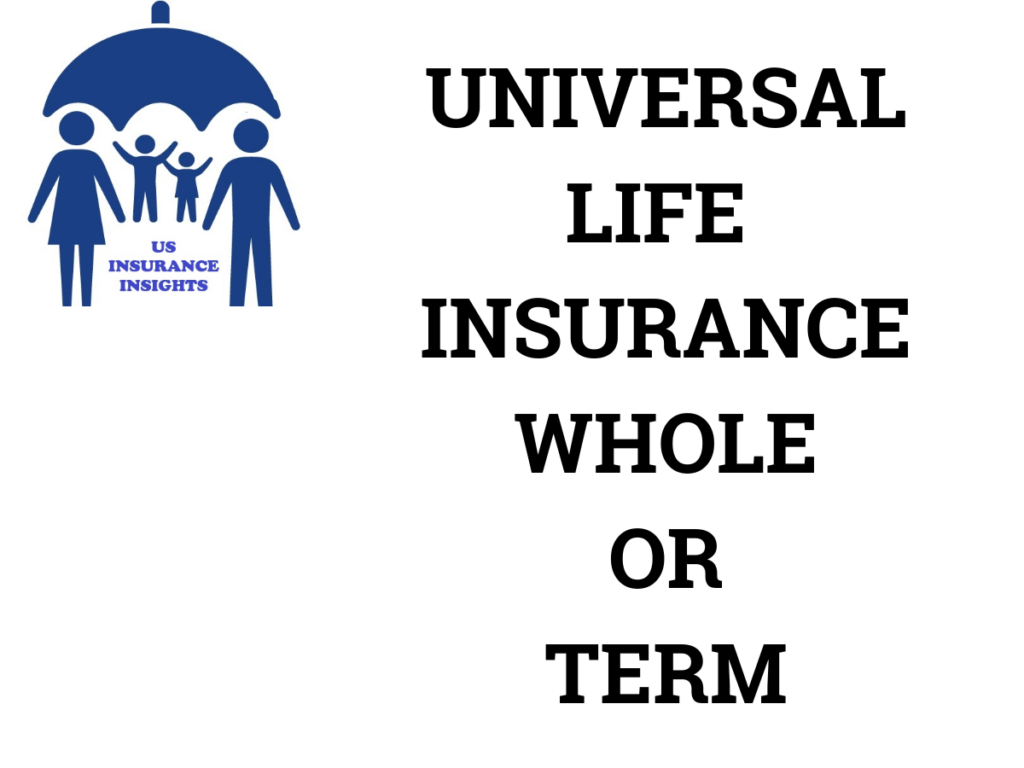Universal life insurance whole or term? Introduction
Comparing Whole and Term Universal Life Insurance.
When it comes to securing your financial future, universal life insurance whole or term is a common debate. Many people find it hard to pick between term life insurance, whole life insurance and universal life insurance, but being aware of each type’s differences helps you decide what is best for you.
We can look at it another way so you have a clear idea of how each fits into your financial life.
Universal life insurance is a type of insurance.
Universal life insurance (UL) is a type of permanent life insurance that gives you a death benefit and a cash value. Unlike term life insurance, UL insurance will stay in effect for your entire life if you keep making the required payments.
Having universal life insurance means you can manage your premiums and the money your family will get if you die when the time comes.
Universal life insurance is described in this section.
The cost of insurance (COI) is taken from your premium and any extra money goes into a cash value account.
Cash value increases – Depending on the policy, it earns either market-based interest or a fixed interest rate.
Flexible payments – You may use part of your policy to pay your next premiums.
Coverage never ends – As long as the premiums are paid on time, the insurance is valid for life.
Which is better–Universal Life, Whole Life or Term Life?
1. Term Life Insurance is cheap but your coverage lasts only for a certain period.
People who want temporary insurance coverage at a low cost often choose term life. The policy pays out a death benefit for a specified number of years (usually 10, 20 or 30 years). If you die at any time up to the maturity date, your beneficiaries get the money.
- Some of the good sides of Term Life Insurance are:
- Term policies cost less upfront than permanent ones.
- Straightforward and simple insurance.
- Beneficial for families with short-term needs or for younger people.
Problems with Term Life Insurance:
- Like other kinds of insurance, it offers a benefit only when the person covered dies.
- The policy is only valid during your term – No payout is given if you outlast the term.
- Expect to pay a lot for renewal – You could end up paying much more for the same coverage when you renew.
- Mike, aged 35 and a father, takes a 20-year term life insurance policy to help his family in the event of his death while they pay off their home. If he dies within 20 years, the insurance company pays the whole sum to his family.
2. Whole Life Insurance – Lifelong Safety Plus Savings That Are Not Affected by the Market
Whole life insurance is permanent insurance that pays out the same death benefit and lets the cash value build up over time. With whole life policies, the premiums never change and the growth is planned.
Advantages of Whole Life Insurance are:
- Lifetime protection from guaranteed death benefits.
- Fixed insurance rates – You always pay the same amount.
- Cash value is always growing by a predetermined amount.
Issues with Whole Life Insurance:
- Greater cost as compared to term life insurance.
- You have less control with conversion life insurance than with universal life insurance.
- Few ways to grow investment funds.
- 💡 Lisa gets a whole life policy when she is 40. When she retires, she has access to the cash value from her policy which she can use in addition to her pension.
3. Universal Life Insurance Is the Best Mix of Life and Investment Plan?
Universal life insurance is flexible as whole life, but covers you for a longer period than term life insurance. You can vary your premiums and the amount paid to beneficiaries which is an advantage for those seeking secure coverage for a long period.
Advantages of Universal Life Insurance are:
- Set your policy premium to fit your own requirements.
- Future premiums can be funded by the cash in the policy and the cash in the policy can also be borrowed.
- A one-time fee – so no worries about renewing like term policies.
Problems with Universal Life Insurance:
- Policies may have growth linked to daily changes in the market or policies.
- Needs regular attention – If policies are not actively maintained, they can become invalid.
- The cost of a premium might rise if the policy performs poorly.
- Example: With age 45, James decides to get coverage with a universal life insurance policy. He modifies his policy payments according to how the business does, ensuring he stays insured and makes the most of his money.
Ways to Decide on Whether to Buy Term, Whole or Universal Life Insurance
Should you be confused about the best life insurance choice for yourself, try these steps:
1. Check Your Financial Dreams
- If you want inexpensive coverage for only a short time, term life insurance is the right choice.
- For people who want their premiums set and coverage to continue forever, whole life insurance works well.
- If you need life insurance for a long time and want some options, universal life insurance may be a good fit.
2. Make a budget to know what you can afford.
- Term life insurance has the lowest cost of all life insurance types.
- You have to pay more premiums for whole life insurance, but you are sure of increasing cash value.
- With universal life insurance, the premiums can be changed, but you have to watch it regularly.
3. Consider How Others Will be Affected
- If you have young kids, a term life insurance policy can support you until your children grow up and are financially independent.
- A whole life policy provides certain benefits if you want to give an inheritance.
- If you prefer a policy that could change as your needs do, universal life insurance is a good pick.
In conclusion which type of life insurance is the best?
Whether you select universal life, whole life or term life depends on your own financial circumstance. Let me give you a short summary:
- ✓ Term Life Insurance provides inexpensive life cover only for a certain period.
- Whole Life Insurance lasts for your whole life and the premium never changes.
- Flexible, long-term coverage is what you will find with Universal Life Insurance.
- Universal life insurance could be the best choice for those who want the benefits of both term and permanent life insurance. If you want a type of life insurance that won’t change, choose whole life insurance and if your budget is limited, term life insurance is better.
- Getting advice from a financial professional can help you select the insurance that suits your situation.


2 thoughts on “Universal Life Insurance Whole or Term – Which is Best for You?”